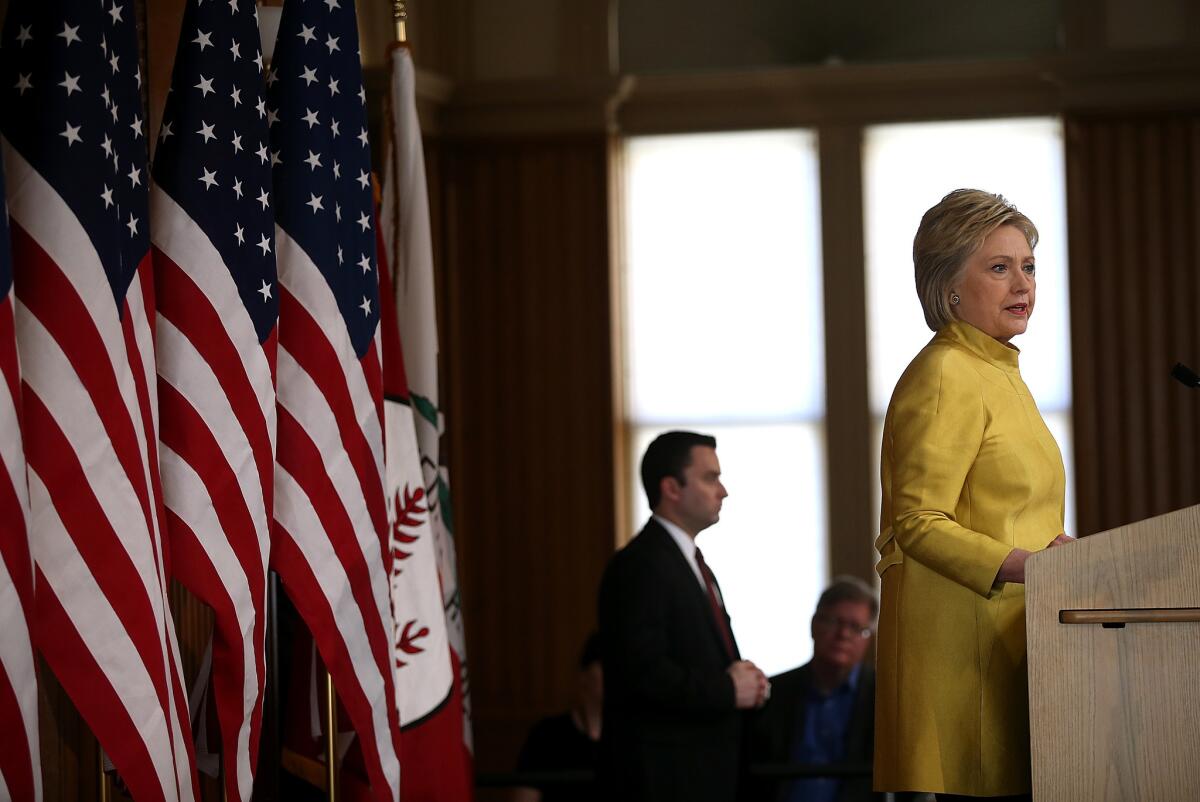Clinton takes on Trump and Cruz at Stanford address on terrorism

Hillary Clinton delivers a counter-terrorism address at Stanford University on March 23.
Reporting from Washington — Hillary Clinton on Wednesday sought to position herself as the only candidate equipped to deal with international terrorism at a time her Republican rivals are calling for police monitoring of American Muslim communities, rethinking of America’s alliance with NATO and carpet bombing in the Middle East.
In tone, in body language and in the content of her speech at Stanford University, Clinton drew a stark contrast with Republicans Donald Trump and Sen. Ted Cruz, whose remarks in the wake of the Brussels bombings she labeled as “incendiary” and “dangerous.”
The speech offered a preview of the approach Clinton plans to take not just toward terrorism but also toward either of the Republicans in a general election matchup.
Election 2016 | Live coverage on Trail Guide | March 22 election results | Track the delegate race | Sign up for the newsletter
The remarks came on a day when Clinton and her Democratic rival, Sen. Bernie Sanders, were in California, a delegate-rich state where both campaigns intend to fight fiercely for votes, even as Clinton is on track to have the nomination largely sewn up by the time the state’s voters go to the polls in June.
In keeping with the state of the Democratic race, Clinton’s attention was not Sanders when she stepped onto the podium to talk about terrorism. Instead, she focused on the Republicans.
“We need to rely on what actually works, not bluster that alienates our partners and doesn’t make us any safer,” Clinton said.
“We face an adversary that is constantly adapting and operating across multiple theaters,” she said. “Our response must be just as nimble and far reaching. We need to reinforce the alliances that have been pillars of American power for decades.”
Clinton said Cruz’s remarks about carpet-bombing the Islamic State militants “into oblivion” were reckless and demonstrated that he was in over his head.
Trump’s call to use torture in the fight against terrorists “puts our own troops and, increasingly our own civilians, at risk,” she said. And Trump’s call to reevaluate America’s relationship with the North Atlantic Treaty Organization would “reverse decades of bipartisan leadership and send a dangerous signal.”
Clinton also used the speech at Stanford, which is deeply connected to Silicon Valley’s technology companies, to put the industry on notice that she expects more help in combating terrorism.
Although the FBI may have found a workaround in its dispute with Apple over unlocking an encrypted phone used in the San Bernardino terrorist attack, more disputes are certain to come, she said. She called for a national commission on encryption that would seek solutions to protecting privacy while giving law enforcement the tools it needs to tack down terrorists.
“Impenetrable encryption provides significant cybersecurity advantages, but it may also make it harder for law enforcement,” Clinton said. “ISIS knows this.”
The speech overall set out in detail a message that Clinton has telegraphed in campaign appearances -- her claim that she is the lone experienced hand in the race, the only candidate equipped to lead the country through dangerous times and hold together the international alliances crucial to maintaining America’s dominance in the world and keeping its citizens safe.
Clinton spoke in a calm, measured tone, seemingly designed to create an image of statesmanship in contrast to her GOP rivals, whose blustery comments after the Brussels bombing grew increasingly provocative with each cable news interview.
Republicans, however, remain confident that foreign policy remains a major weakness for Clinton, who was secretary of State under an administration that has failed to contain Islamic State, also called ISIS.
“Just watched Hillary deliver a prepackaged speech on terror,” Trump tweeted. “She’s been in office fighting terror for 20 years - and look where we are!”
Clinton mapped out a strategy for containing Islamic State that relies on bolstering the NATO alliance, stepping up support for allies in the Middle East and redoubling efforts to use technology to combat terrorism.
“For decades, Republican and Democratic administrations have understood our alliances have made us stronger,” she said.
“Allies extend our reach, share intelligence, provide troops,” she said, slamming Trump’s plans to insist that U.S. allies pay the cost of American backing. “Turning our alliance into a protection racket would reverse decades of bipartisan leadership and send a dangerous signal to friend and foe alike,” she said.
In recent interviews with the Washington Post and CNN, Trump has said that the NATO alliance costs America too much money. As president he would reevaluate the financial arrangements, he said.
Clinton said such an approach would delight Russian President Vladimir Putin, who is eager to divide the alliance.
“If Mr. Trump gets his way, it will be like Christmas in the Kremlin,” she said. “It will make America less safe and the world more dangerous.”
Clinton said the call by Trump and Cruz for surveillance of American Muslim communities suggests they have a fundamental misunderstanding of where the dangers lie.
“These Americans are a crucial line of defense against terrorism,” she said. “They are most likely to recognize the warning sign of radicalization.”
She quoted New York Police Commissioner William J. Bratton, who said Wednesday that Cruz “doesn’t know what the hell he is talking about.”
For more on Campaign 2016, follow @EvanHalper.
ALSO
Terrorism again collides with the 2016 campaign
Clinton wins Arizona primary; Sanders takes Utah and Idaho caucuses
Hours after Trump wins Arizona, Jeb Bush endorses Ted Cruz
More to Read
Get the L.A. Times Politics newsletter
Deeply reported insights into legislation, politics and policy from Sacramento, Washington and beyond. In your inbox three times per week.
You may occasionally receive promotional content from the Los Angeles Times.











